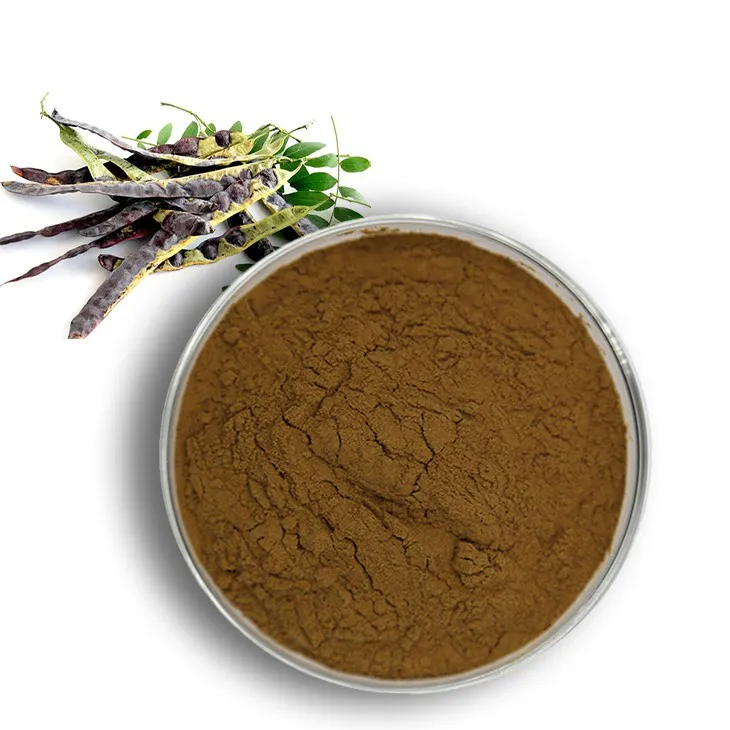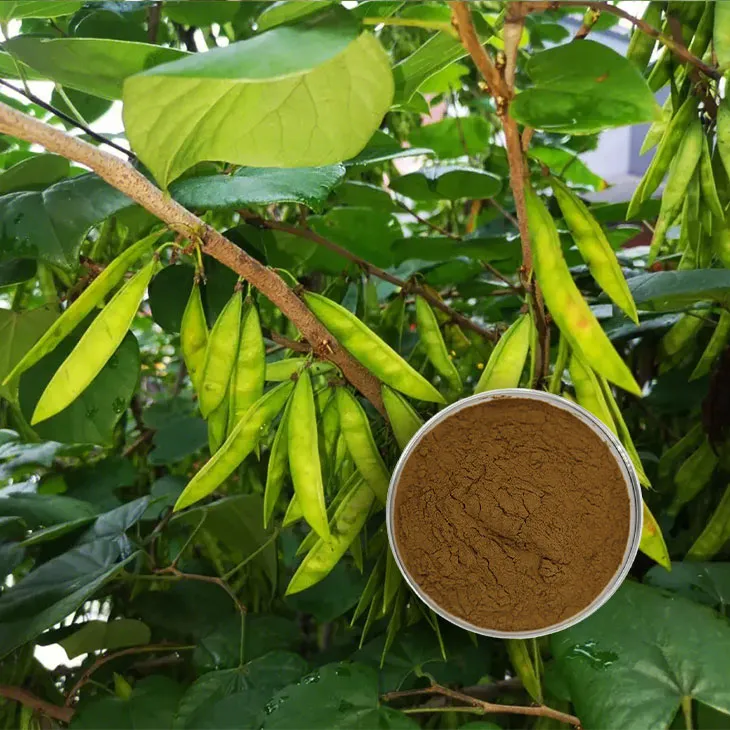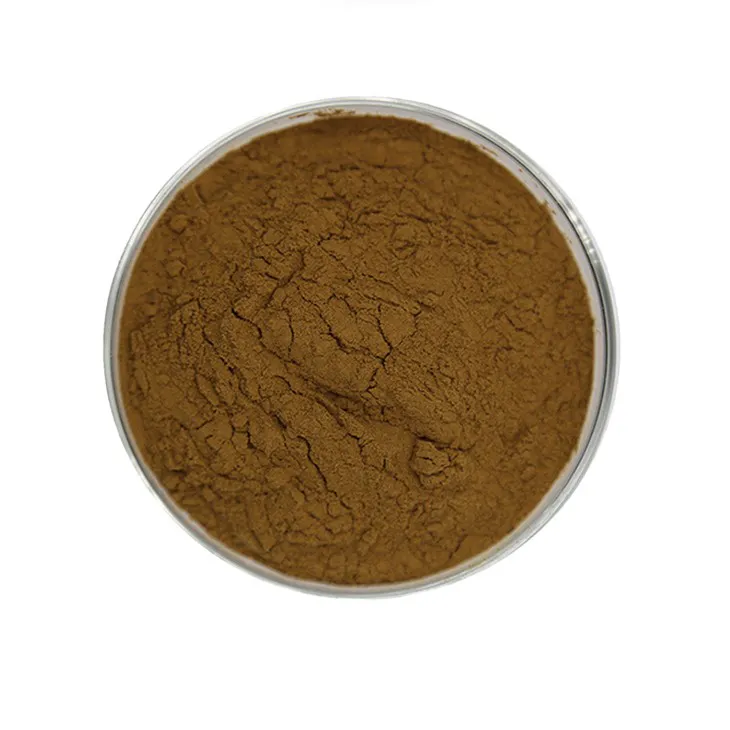- 0086-571-85302990
- sales@greenskybio.com
What are saponin extracts and why are they used on the skin?
2024-11-12

1. Introduction to Saponin Extracts
Saponin Extracts are natural compounds that are obtained from a wide variety of plants. These compounds are known for their unique chemical structure, which typically consists of a hydrophobic aglycone part and a hydrophilic sugar moiety. This structure gives saponins their characteristic surfactant - like properties. They can form a soapy lather when mixed with water, which is where their name, "saponin," is derived from. Saponins are found in many different plant families, such as the legume family (Fabaceae), the ginseng family (Araliaceae), and the soapwort family (Caryophyllaceae).

2. Sources of Saponin Extracts
There are numerous plant sources from which saponin extracts can be obtained.
2.1 Ginseng
Ginseng is a well - known plant in traditional medicine. It contains saponins known as ginsenosides. Different types of ginseng, such as Asian ginseng (Panax ginseng) and American ginseng (Panax quinquefolius), have different compositions of ginsenosides. These saponins are believed to contribute to ginseng's reputed health - promoting properties, including potential benefits for the skin.
2.2 Soapwort
As the name suggests, soapwort (Saponaria officinalis) is a rich source of saponins. Historically, it has been used for its cleansing properties. The saponins in soapwort can be extracted and used in various applications, including in skincare products.
2.3 Quillaja
Quillaja saponaria is a South American tree that yields saponin extracts. These extracts are used in the food, pharmaceutical, and cosmetic industries. In skincare, the saponins from Quillaja can provide certain beneficial effects on the skin.

3. Chemical Properties of Saponin Extracts
Saponin extracts have several important chemical properties that are relevant to their use on the skin.
3.1 Amphiphilic Nature
As mentioned earlier, saponins are amphiphilic, meaning they have both hydrophobic (water - hating) and hydrophilic (water - loving) parts. This property allows them to interact with both oily and aqueous substances. In skincare, this is beneficial as it can help in emulsifying oils and water - based ingredients in products. For example, in a moisturizer, saponin extracts can help to keep the oil and water components mixed together evenly, ensuring a smooth texture and proper delivery of active ingredients to the skin.
3.2 Foaming Ability
Their ability to form foam when agitated in water is another characteristic chemical property. While this foaming property may not be directly related to all skin benefits, it is useful in certain skincare products like cleansers. In a facial cleanser, the foaming action of saponin extracts can help to physically remove dirt, excess oil, and impurities from the skin surface without being overly harsh, as they are natural surfactants compared to some synthetic ones.

4. Benefits of Saponin Extracts for the Skin
Saponin extracts offer a range of benefits when used on the skin.
4.1 Antioxidant Activity
One of the significant benefits is their antioxidant activity. The skin is constantly exposed to environmental stressors such as ultraviolet (UV) radiation, pollution, and chemicals, which can generate free radicals. Free radicals are highly reactive molecules that can damage skin cells, leading to premature skin aging, wrinkles, and a dull complexion. Saponin extracts, with their antioxidant properties, can neutralize these free radicals. For example, they can scavenge free radicals like superoxide anions and hydroxyl radicals, thereby protecting the skin cells from oxidative damage. This helps in maintaining the skin's youthful appearance and overall health.
4.2 Anti - Inflammatory Characteristics
Saponin extracts also possess anti - inflammatory properties. Skin inflammation can be caused by various factors, including allergens, irritants, and skin diseases. Inflammatory responses in the skin often manifest as redness, swelling, and irritation. The anti - inflammatory action of saponin extracts can help to reduce these symptoms. They can inhibit the production of inflammatory mediators such as cytokines and prostaglandins. For instance, in cases of mild skin irritations or eczema, products containing saponin extracts may help to soothe the skin and reduce redness.
4.3 Enhancement of Skin Permeability
Another important benefit is the ability of saponin extracts to enhance skin permeability. The outermost layer of the skin, the stratum corneum, acts as a barrier to prevent the entry of harmful substances but can also limit the absorption of beneficial skincare ingredients. Saponin extracts can interact with the lipids in the stratum corneum, temporarily disrupting its structure in a non - harmful way. This allows other active ingredients in skincare products, such as vitamins, peptides, and hyaluronic acid, to penetrate more easily into the deeper layers of the skin. As a result, these ingredients can be more effective in performing their functions, such as providing hydration, promoting collagen production, or reducing pigmentation.
4.4 Skin Hydration
Although not as directly as some other ingredients, saponin extracts can contribute to skin hydration. By improving skin permeability, they can help the skin to retain moisture more effectively. Additionally, some saponins may have a mild humectant effect, which means they can attract and hold water molecules. This can leave the skin feeling soft and supple, reducing the appearance of dryness and flakiness.

5. How Saponin Extracts are Used in Skincare Products
Saponin extracts are incorporated into various types of skincare products in different ways.
5.1 Cleansers
In cleansers, saponin extracts are used for their foaming and cleansing properties. They can effectively remove dirt, makeup, and excess oil from the skin. Since they are natural surfactants, they are often considered a gentler alternative to some harsh synthetic surfactants. For example, a facial cleanser with saponin extracts from soapwort can provide a mild yet effective cleansing experience, leaving the skin clean but not overly stripped of its natural oils.
5.2 Toners
Toners with saponin extracts can help to further clean the skin and balance its pH level. After cleansing, the skin may have a slightly alkaline pH, and using a toner with saponin extracts can help to restore the skin's natural acidic pH. This is important as the proper pH balance helps to maintain the skin's barrier function and overall health.
5.3 Serums and Moisturizers
In serums and moisturizers, saponin extracts are mainly used for their ability to enhance skin permeability. They can help the other active ingredients in these products, such as antioxidants, peptides, and hyaluronic acid, to penetrate deeper into the skin. This way, the overall effectiveness of the serum or moisturizer is increased. For example, a serum containing saponin extracts along with vitamin C can deliver the antioxidant benefits of vitamin C more effectively to the skin cells, helping to brighten the complexion and protect against free radical damage.
6. Safety Considerations of Using Saponin Extracts on the Skin
While saponin extracts offer many benefits for the skin, there are also some safety considerations to keep in mind.
6.1 Allergic Reactions
Some individuals may be allergic to saponin extracts, especially those with sensitive skin or pre - existing skin allergies. Allergic reactions can range from mild redness and itching to more severe symptoms like swelling and hives. It is important to do a patch test before using a product containing saponin extracts for the first time. A patch test involves applying a small amount of the product to a small area of skin, usually on the inner forearm, and waiting for 24 - 48 hours to see if any adverse reactions occur.
6.2 Concentration and Purity
The concentration and purity of saponin extracts in skincare products can also affect their safety and efficacy. High concentrations of saponin extracts may cause irritation in some people, especially if the extracts are not properly purified. Manufacturers need to ensure that the saponin extracts used in their products are of high quality and are present in appropriate concentrations to avoid potential side effects.
7. Conclusion
Saponin extracts are natural compounds with a variety of beneficial properties for the skin. Their antioxidant, anti - inflammatory, and skin - permeability - enhancing abilities make them valuable ingredients in skincare products. However, as with any skincare ingredient, safety considerations such as potential allergic reactions and proper concentration need to be taken into account. Overall, when used appropriately, saponin extracts can contribute to healthier, more youthful - looking skin.
FAQ:
1. What are the main sources of saponin extracts?
There are many plants that can be sources of saponin extracts. For example, ginseng is a well - known source. It contains a significant amount of saponins. Another common source is licorice root. Soapwort plants are also rich in saponin extracts. Different plants may have different types and compositions of saponins, which may lead to slightly different effects on the skin.
2. Are there any side effects of using saponin extracts on the skin?
While saponin extracts are generally considered safe for skin use, some people may be allergic to them. Skin reactions such as itching, redness, or a rash may occur in sensitive individuals. It is always advisable to do a patch test before using a product containing saponin extracts on a large area of the skin. Also, if the saponin extract is not properly purified, there may be some impurities that could potentially cause skin problems.
3. How do saponin extracts compare to other skin - beneficial compounds?
Compared to some other skin - beneficial compounds, saponin extracts have their unique features. For example, compared to vitamin C which is mainly known for its antioxidant property, saponin extracts not only have antioxidant activity but also anti - inflammatory and skin permeability - enhancing effects. Hyaluronic acid is mainly used for skin hydration, while saponin extracts focus more on anti - aging, anti - inflammation and promoting the absorption of other ingredients. Each compound has its own role, and in some skincare products, they may be combined to achieve better overall skin - care effects.
4. Can saponin extracts be used on all skin types?
In general, saponin extracts can be used on different skin types. For oily skin, its anti - inflammatory properties can help reduce acne - related inflammation. For dry skin, when combined with appropriate moisturizing ingredients, it can enhance the overall effectiveness of the skincare product due to its ability to improve ingredient absorption. However, as mentioned before, those with sensitive skin need to be cautious and do a patch test first, as there is a potential for allergic reactions.
5. How are saponin extracts incorporated into skincare products?
Saponin extracts can be incorporated into skincare products in various ways. They can be added as an active ingredient in creams, lotions, serums, or masks. In the manufacturing process, the extract is usually purified and then blended with other ingredients such as emulsifiers, preservatives, and moisturizers. The concentration of saponin extracts in different products may vary depending on the intended effect. For example, products focused on anti - aging may have a relatively higher concentration of saponin extracts.
Related literature
- The Role of Saponin Extracts in Skincare: A Comprehensive Review"
- "Saponin - Rich Plants and Their Applications in Dermatology"
- "Beneficial Effects of Saponins on Skin Health: An Overview"
- ▶ Hesperidin
- ▶ citrus bioflavonoids
- ▶ plant extract
- ▶ lycopene
- ▶ Diosmin
- ▶ Grape seed extract
- ▶ Sea buckthorn Juice Powder
- ▶ Beetroot powder
- ▶ Hops Extract
- ▶ Artichoke Extract
- ▶ Reishi mushroom extract
- ▶ Astaxanthin
- ▶ Green Tea Extract
- ▶ Curcumin Extract
- ▶ Horse Chestnut Extract
- ▶ Other Problems
- ▶ Boswellia Serrata Extract
- ▶ Resveratrol Extract
- ▶ Marigold Extract
- ▶ Grape Leaf Extract
- ▶ blog3
- ▶ blog4
- ▶ blog5
-
Organic Tongkat Ali extract powder factory.
2024-11-12
-
How to make powder with ashwagandha extract.
2024-11-12
-
Rosehip extract manufacturers from China.
2024-11-12
-
The best cat's claw extract in nature.
2024-11-12
-
Chinese Dandelion Leaf Extract Suppliers.
2024-11-12
-
Beetroot Powder
2024-11-12
-
Milk Thistle Extract
2024-11-12
-
Sea buckthorn oil
2024-11-12
-
Ginseng Root Extract
2024-11-12
-
Alisma Extract
2024-11-12
-
Calendula Extract
2024-11-12
-
Cassia Seed Extract
2024-11-12
-
Moringa powder
2024-11-12
-
Mango flavored powder
2024-11-12
-
Marigold Extract
2024-11-12





















